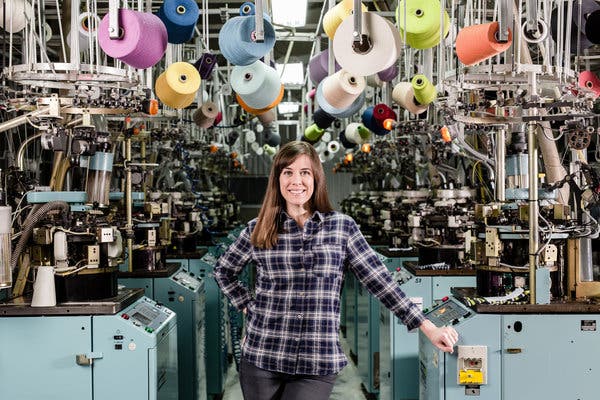“We shall draw from the heart of suffering itself the means of inspiration and survival. Sure I am of this that you have only to endure to conquer.” Winston Churchill
Early 2008 – Ft. Payne, Alabama: Terry and Regina Locklear sat in the office at their sock mill, Emi-G Knitting, wondering what the future held for them. The mill was quiet. All the workers were laid off, except for a few key employees. On the days the plant operated, it ran at 30% capacity, which didn’t come close to paying the bills.
Terry knew they should close the plant, like so many sock mill owners in town had done. But his stubborn heart told him to hang on. He knew if they closed the doors, they would never re-open the plant.
For decades the green sign on the road into town had declared, “Welcome to Ft. Payne – The Official Sock Capital of the World.” Sock making had been king in the town of 14,000 since W.B. Davis opened the first mill in 1907. In 1994, when the North American Free Trade Agreement was passed, there were more than 125 sock mills employing almost 8,000 people. When cheaper imported socks hit the American market the mill closures were rapid and devastating.
Terry Locklear had long dreamed of having his own sock mill. In 1991, he quit his job as the general manager of a Chrysler dealership, took a leap of faith and with borrowed money started his own mill. He named it Emi-G Knitting after his two young daughters Emily and Gina. Terry and Regina worked long hours for years to build their business. By 2005, annual sales totaled almost $3 million. Russell Mills in nearby Alex City was their anchor customer and white athletic socks were their bread and butter.
On a particularly difficult day in 2008, 26-year old Gina showed up at the plant. She had decided to quit her real estate job in Birmingham and join the family business. Passionate about organic and green living, Gina excitedly suggested they introduce a fashion sock made from organic cotton and dyes.
Terry, a disciple of white athletic socks sold in bulk to big box retailers, wasn’t buying her idea. He was deeply concerned about Gina joining a business whose future was in the past. He knew the new product would require new sock machines at a time when there was no money for investing.
Gina persisted and her enthusiasm eventually influenced her father to commit a small budget for product development. Gina sought the help of Billy Reid, one of Alabama’s leading men’s clothing designers. After considerable research and product development, Gina persuaded Emi-G mill manager Vance Veal to tackle what her father thought impossible – produce a six-color, multiple-pattern sock. He did it. After the purchase of several state of the art Italian sock machines and many trials, Gina’s new product was born.
In late 2008, Gina introduced the Zkano line of six-color fashion socks for women made from organic cotton grown in Lubbock, Texas, and dyed yarns sourced from North Carolina. The socks, aimed at 15 to 35 year olds, featured trendy stripes, polka dots, and colors. Emi-G followed the women’s sock success with the introduction of men’s fashion socks.
In 2013, Emi-G introduced another line, Little River Mill Socks, named after the river that flows near the factory. The two popular sock brands were sold online directly from Emi-G and in over 200 stores across the country. Socks sold for $15 to $30 a pair.
Gina was 12 when Terry started his sock mill. She had doodled colorful sock designs in a notebook and helped in the mill by sorting socks. Almost 30 years later, she designs the socks and Vance Veal figures out how to configure the machines to produce her designs.
Today there are less than 10 sock mills operating in a town that once produced 600 million dozen pairs of socks annually – 12 percent of the world’s socks. In the shadow of Little River Canyon, the Emi-G factory sock machines are humming. Gina Locklear refused to accept the inevitable and saved the business that her parents worked so hard to build.

I saw her on the national news recently. Very impressive and should be an inspiration to all young entrepreneurs. It has been more apparent during Covid, that we need more products made in the USA!
Great story.